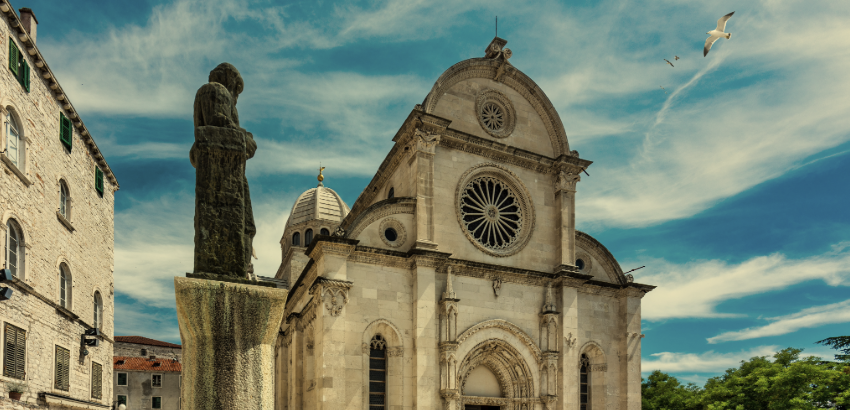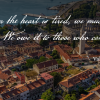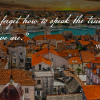
Published: September 1, 2003
View the Original Newsletter: Iskra-124.pdf
About This Issue
Iskra No. 124 arrives in the heat of late summer — both literal and political. Valentina Krčmar opens the issue by reflecting on the great blackout that struck Ontario, drawing parallels between the brief chaos in Canada and the constant instability in Croatia. “How dependent we’ve become,” she muses, “that even a few hours without power leave us helpless.”
This issue captures a season of extremes: fires raging across the Croatian coast, political unrest, and social fatigue — yet also moments of humor, compassion, and beauty. It is a portrait of a homeland both burning and enduring, of a diaspora longing for better days but refusing to turn away.
Editorial: “Between Fire and Light”
Valentina’s editorial blends personal reflection with sharp social commentary. From the safety of Canada, she watches reports of devastating fires sweeping through Dalmatia, expressing shock at the unpreparedness and negligence of Croatian authorities.
“Those most responsible have not ensured even the basics for our firefighters — fair wages, food, and water.”
She openly criticizes President Stjepan Mesić’s visit to Libya, calling it “a disgraceful gesture” toward a dictator like Muammar Gaddafi. Yet her tone softens when she turns toward the readers, offering heartfelt wishes for the ill and aging members of the community.
“To those who suffer, and those who care for them — I wish you strength. I know what it means to watch someone you love in pain.”
She closes her note with a personal confession: by the time readers receive this issue, she will be in Croatia attending a close friend’s daughter’s wedding. “Yes, again,” she laughs gently. “But this time, it’s for joy.”
National & Political News: “Croatia in Flames”
The heart of the issue is the tragedy of Croatia’s wildfires — described as “the worst in living memory.” Dozens of articles chronicle the destruction:
-
Eighty percent more fires than the previous year, particularly in Dalmatia and along the Adriatic coast.
-
Over 1,500 firefighters battled relentless blazes, often without food or rest, supported by Canadair aircraft and volunteers.
-
Reports cite “negligence and disorganization,” worsened by drought and bureaucracy.
Valentina republishes an analysis noting that most fires were caused by human negligence. “Warnings were given,” she writes, “but not heard. And so the nation burns.”
Amid tragedy, there are flashes of heroism — firefighters on Hvar, Brač, and Biokovo, who fought flames “until their boots melted.”
National Politics
Foreign Minister Tonino Picula defends Croatia’s cooperation with the Hague Tribunal, rejecting rumors of sanctions and calling for continued seriousness in addressing the Ante Gotovina case. “Gotovina’s innocence or guilt,” Picula said, “can only be proven in The Hague.”
The report illustrates the tension between Croatia’s desire for European Union membership and its internal struggle with justice, memory, and pride.
Community News: “Faith and Everyday Courage”
The Toronto Croatian community continues to thrive despite global anxieties. Iskra highlights local leaders and events, including:
-
The HBZ (Croatian Fraternal Union) picnic, attended by new Croatian Consul Mario Livaja and Canadian MP Janko Perić.
-
A pilgrimage to Saint Anne’s Shrine in Quebec, bringing together parishes from Mississauga and Oakville in faith and fellowship.
-
An open call to business leaders to visit the Zagreb Autumn Trade Fair, strengthening ties between Croatian and Canadian entrepreneurs.
Valentina also features Rose Andrachuk (Bukovac), running for provincial office as a Progressive Conservative candidate — celebrating her leadership and service to Catholic education.
Culture & Heritage: “The Village and the Word”
The cultural pages explore Croatia’s rural literary tradition in the article “Selo i naši seljački književnici” (“The Village and Our Peasant Writers”), celebrating the authenticity and wisdom of country poets. Another feature delves into the Velebit mountain fortresses and their archaeological significance.
An essay titled “How Much Do You Know About the Old Bridge in Mostar?” recounts the bridge’s long history and cultural symbolism, just weeks before its full reconstruction began.
Health & Wellness: “Healing from the Earth”
Dr. Darko Desaty writes at length about the power of vegetables — particularly lettuce, spinach, chicory, and dandelion — to cleanse the liver and kidneys. His column reads like both a medical guide and a love letter to the natural world:
“We do not live by bread alone — we live by what nourishes our cells and quiets our spirit.”
The section offers nutritional details, remedies, and encouragement to choose natural foods over synthetic solutions, echoing Iskra’s recurring theme of harmony between body and soul.
Humor & Everyday Life
A full page of humor reminds readers that laughter is resistance. Jokes range from political satire to marriage quips (“What do you call a woman who always knows where her husband is? A widow.”) to a running series titled “Trač kao moralna kategorija” — an essay humorously dissecting gossip as “the most democratic form of literature.”
Valentina ensures readers never leave without a smile — ending the page with a Zagorje folk song, “Tri ptičice goru preletele”, a hymn of peace and renewal.
Closing Reflection
Iskra No. 124 ends with Valentina’s characteristic mix of realism and tenderness. The fires in Croatia, both literal and moral, mirror the challenges of her own work — publishing truth in a divided community.
“Perhaps we can’t stop every blaze,” she writes, “but we can at least light one honest flame.”
Her closing wish is simple: “May every Croatian home — wherever it stands — know health, laughter, and light.”




